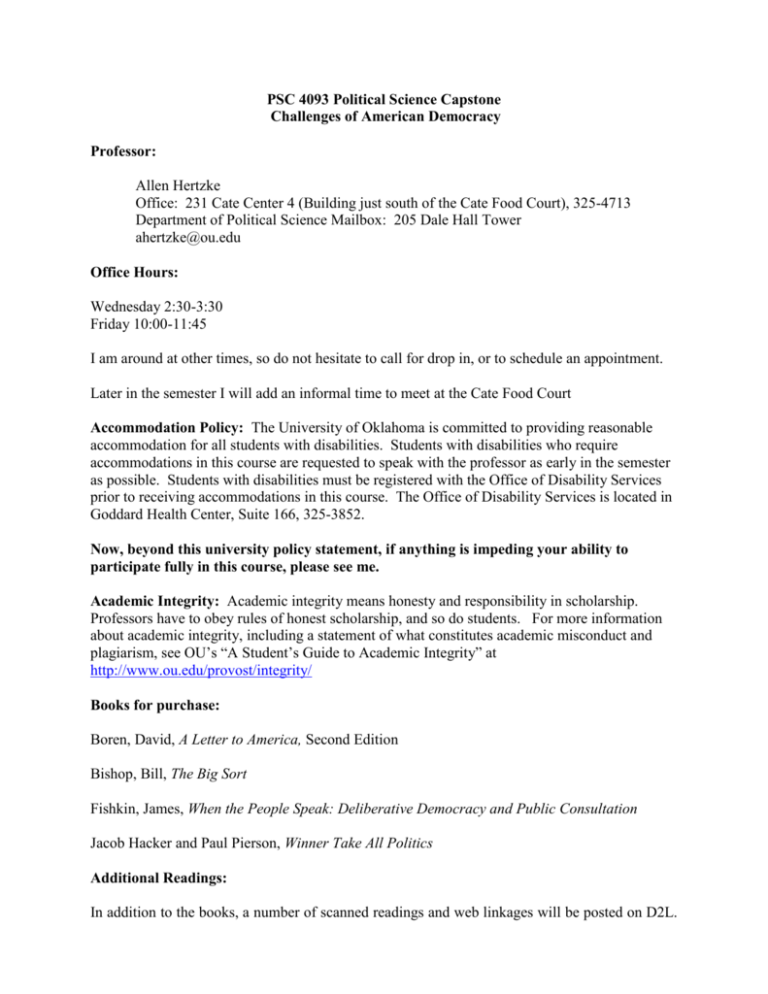Political Science Capstone: Challenges of American Democracy
advertisement

PSC 4093 Political Science Capstone Challenges of American Democracy Professor: Allen Hertzke Office: 231 Cate Center 4 (Building just south of the Cate Food Court), 325-4713 Department of Political Science Mailbox: 205 Dale Hall Tower ahertzke@ou.edu Office Hours: Wednesday 2:30-3:30 Friday 10:00-11:45 I am around at other times, so do not hesitate to call for drop in, or to schedule an appointment. Later in the semester I will add an informal time to meet at the Cate Food Court Accommodation Policy: The University of Oklahoma is committed to providing reasonable accommodation for all students with disabilities. Students with disabilities who require accommodations in this course are requested to speak with the professor as early in the semester as possible. Students with disabilities must be registered with the Office of Disability Services prior to receiving accommodations in this course. The Office of Disability Services is located in Goddard Health Center, Suite 166, 325-3852. Now, beyond this university policy statement, if anything is impeding your ability to participate fully in this course, please see me. Academic Integrity: Academic integrity means honesty and responsibility in scholarship. Professors have to obey rules of honest scholarship, and so do students. For more information about academic integrity, including a statement of what constitutes academic misconduct and plagiarism, see OU’s “A Student’s Guide to Academic Integrity” at http://www.ou.edu/provost/integrity/ Books for purchase: Boren, David, A Letter to America, Second Edition Bishop, Bill, The Big Sort Fishkin, James, When the People Speak: Deliberative Democracy and Public Consultation Jacob Hacker and Paul Pierson, Winner Take All Politics Additional Readings: In addition to the books, a number of scanned readings and web linkages will be posted on D2L. Many of these are listed in the course outline, but additional ones will be posted as we go along. Pay attention to announcements in class, on D2L, or occasionally your OU e-mail. Assignments: Midterm: Weekly writings: Research Paper: Final Exam Class Participation: 20% 20% 25% (15-20 pages) 25% 10% and strong fudge factor Weekly Written Reactions: A 1-2 page reaction to select readings will be due each week with the exception the coming week (when we will have a discussion board instead), midterm week, the week the final paper is due, and before the final exam. These postings should be thoughtful and crisply written and posted on the D2L course site by Sunday at 6:00 pm. Late papers will be docked. Guidance on the specifics of each assignment will be announced on D2L. Please post in a word document. Final Research Paper: Introduction: The Capstone in political science does several things: it allows students to explore topics in depth in a small class setting; it provides a venue for substantial research projects; it enables students to integrate aspects of their undergraduate training. Capstones generally have a thematic focus. This course theme is the health of American democracy, and how that shapes our political system’s response to major challenges. A growing scholarly and popularly literature has catalogued concerns about community vitality, citizenship, civic engagement, the tenor of public discourse, political polarization, trust in institutions, and leadership quality. Other literature explores how the nature of civic culture affects our ability to meet the domestic and global challenges facing the nation, such as fiscal responsibility, economic and educational competitiveness, lifting the poor, sustaining the middle class, maintaining the cultural fabric, environmental sustainability, and global leadership in projecting our best values overseas. The class is focused on an intensive reading and discussion of major readings that address some of these interrelated foci. We will employ a variety of teaching modalities to facilitate this objective, including thematic lectures, short weekly writings to help students organize their thinking, student-led discussions and presentations, and team based exercises. Students will write a major research paper addressing some aspect of challenges facing American democracy and present that research to class. Outline: Week 1, January 14: Introduction In-class writing: A paragraph discussing something that concerns you about American society, politics, or government today. Discussion Board exercise on A Letter to America, David Boren. Board opens Friday and closes on Monday at 5:00. Week 2, January 21: No class for Martin Luther King Holiday: Read “Letter from Birmingham Jail” for Discussion the following week. Sunday night posting on Parts I and II of The Big Sort Week 3, January 28: Civic culture and polarization Evidence and roots of cultural Polarization Discussion of The Big Sort Sunday night posting on second half of The Big Sort Week 4, February 4: The political consequences of polarization Religious polarization Political Ramifications of polarization Sunday Posting on Putnam Week 5, February 11: Budget crisis, entitlement reform National Commission on Fiscal Responsibility and Reform Coming Generational Storm, selections Rivlin-Ryan Proposal on Health Care CBO, OMB on deficits and debt Week 6, February 18: Economic competitiveness, decline in middle class, inequality in citizenship Winner Take All Politics – Jacob Hacker and Paul Pierson Week 7, February 25: Winner Take All Politics and critiques Complete Winner Take All Politics Critiques Week 8, March 4: Midterm Discussion of social capital and healthy democracy Week 9, March11: Social Capital, trust, civic engagement, religion, and healthy democracy Articles and selections from Robert Putnam’s Bowling Alone Data on trust in institutions, cynicism, etc. Selections from Bad Religion by Russ Douthat March 18-22: Spring Break Posting on Why Marriage Matters Week 10, March 25, Cultural health – family breakdown, social pathologies, achievement gaps, prison growth Why Marriage Matters, National Marriage Project, U of Virginia Think tank reports and select readings http://www.heritage.org/Research/Reports/2010/09/Marriage-America-s-Greatest-WeaponAgainst-Child-Poverty Week 11, April 1: Educational challenges Select readings on secondary education challenges: inequality, competitiveness, structure Select readings on college challenges: access, cost, efficiency Documentaries Paper proposals due Week 12, April 8: America’s place in the world Select readings, Begin Reading Fishkin Week 13, April 15: Remedies: Deliberative democracy James Fishkin, When the People Speak Class Experiment in Deliberative democracy Begin student presentations Week 14, April 22: Student presentations Papers Due Week 15: April 29: Final Exam







